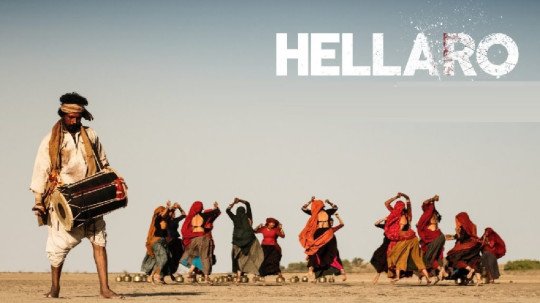In the first scene of director Abhishek Shah’s Gujarati movie Hellaro, a mother tells her daughter that girls are not allowed to do Garba (a dance form). When she asks the reason, her father chips in with, “Girls are not even allowed to ask questions.”
Welcome to the interiors of the rann of Kutch in Samarpur in 1975. It is only the men who are actually living their lives in this village. The women are treated like cattle. They are an object of desire for their respective husbands. They can’t move freely around without permission. Most importantly, they are not allowed to do Garba.
In such a setting arrives Manjhri (Shraddha Dangar) as a bride in one household. She is educated by the standards of other women as she has seen the life in the main city of Kutch. Hellaro is about how these women start experiencing freedom when it is least expected after the arrival of a drum player Mulji (Jayesh More) in their lives.
The film brings back memories of Leena Yadav’s Hindi movie Parched (2016). Although the story took place in Rajasthan, it had the same setting of a village in desert where women are living a life of hell. Except this, Hellaro shares no similarity with the 2016 film in terms of the story as well as the treatment.
Shah manages the challenging task of portraying the minute details of the lives of people in such remote areas with all the detailing in place. The clever and smooth-flowing screenplay is ably supported by some creative presentation. This is enough to make the film relatable to any audience around the world.

The hypocrisy of the men is exposed in a natural way. For example, they won’t let their women go out without a veil but at the same time would lust for the Hindi film heroines. There are moments when the plight of the victims breaks your heart. Like, a man forcefully having sex with his wife, which is nothing but marital rape.
Hellaro goes onto a different plane once the women gradually start treading on the path of Garba. The introduction of which is masterfully done. Shraddha Dangar, Kaushambi Bhatt, Esha Kansara and the rest of the female actors have not only acted convincingly but have also shown natural dancing skills.
Jayesh More, in the role of the drummer who changes things, provides a heart-wrenching act oozing realism throughout. Maulik Nayak’s enthusiasm and comic timing is also worth appreciating. He plays Bhaglo, the only link between this remote village and the city.
The end result is vital here since you badly root for the victims. This is where the film reaches its highest point. Without giving away any spoilers, the last 10-15 minutes evoke various emotions as you sit rapt. Mehul Surti’s music plays a big role not just here but in the entire film.
Also read: Saaho’s major similarity with Baahubali (SPOILERS alert)
The only minus point is in the form of a questionable moment in the end. But it certainly doesn’t turn out to be a bother due to the effect generated.
Overall: Hellaro justifies its National Award for the Best Film. It showcases rebellion where it’s least expected. It indirectly gives a message that if patriarchy can be smashed even in the most regressive places, there is no reason why it should exist anywhere else. Abhishek Shah achieves this in his directorial debut.
Rating: 4.5 out of 5
Director: Abhishek Shah
Producers: Saarthi Productions and Harfanmaula Films
Writers: Abhishek Shah, Prateek Gupta and Soumya Joshi Devvrat
Cast: Shraddha Dangar, Jayesh More, Kaushambi Bhatt, Esha Kansara, Aarjav Trivedi, Maulik Nayak